Watch all the Transform 2020 sessions on-demand here.
Nvidia is on a quest to find the most disruptive artificial intelligence startups. This quest is part of a larger contest, dubbed Nvidia Inception, which is screening more than 600 entrants to cull the best AI startups in three big categories.
We wrote about the first four candidates for the hottest emerging startup on Friday. And now we’re focusing on the next five candidates in the category dubbed the “most disruptive” startups.
Jen-Hsun Huang, CEO of Nvidia, hosted a Shark Tank-style event this week as part of the search to find the best AI startups. Huang and a panel of judges listened to pitches from 14 AI startups across three categories. These were filtered from the more than 600 contestants who entered the Nvidia Inception contest. The winners will walk away with $1.5 million in cash at a dinner on May 10 at Nvidia’s GPU Technology Conference.
“We are in the beginning of one of the largest computing revolutions that we have ever been through,” said Huang, at the opening of the event. “The AI revolution is upon us.”
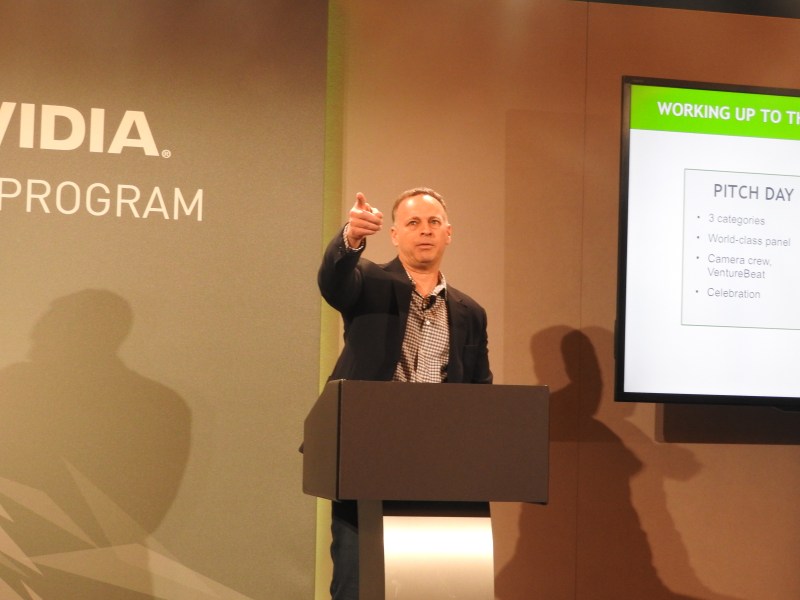
June 5th: The AI Audit in NYC
Join us next week in NYC to engage with top executive leaders, delving into strategies for auditing AI models to ensure fairness, optimal performance, and ethical compliance across diverse organizations. Secure your attendance for this exclusive invite-only event.
Above: Jeff Herbst of Nvidia.
Image Credit: Dean Takahashi
The judges include Gavin Baker, portfolio manager for Fidelity Investments; Tammy Kiely, global head of semiconductor investment banking at Goldman Sachs; Shu Nyatta, investor for the SoftBank Group; Thomas Laffont, senior managing director for Coatue Management; and Prashant Sharma, global chief technology officer for Microsoft Accelerator.
Jeff Herbst, vice president of business development at Nvidia, said in an interview with VentureBeat that the company decided to create a meaningful award to recognize the amazing work being done by AI startups. In the category of disruptive companies, he said Nvidia reviewed more than 250 entrants out of a total of 2,000 AI startups in its database.
I listened to the companies give their pitches to the judges, and this story will focus on the four companies that gave pitches for the hottest emerging startup. One winner in each category will win $375,000, and the runner-up in each category will win $125,000. (We will do a separate story on the third category — social impact startups.)
1. Smartvid.io
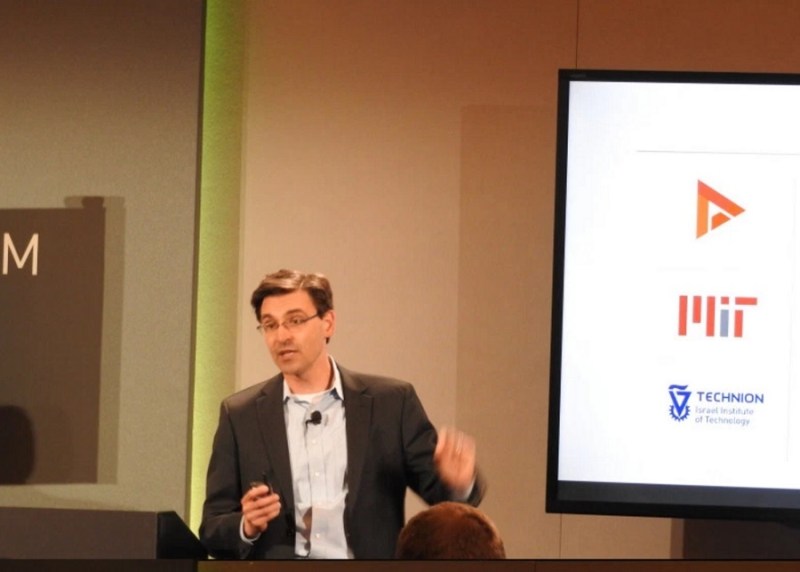
Above: Smartvid.io’s Mike Perozek
Smartvid.io just can’t get enough of disrupting the construction industry.
The Smartvid.io team has been together since 2005. Under their previous startup, Vela Systems, they focused on bringing mobility to construction through field management software, and they sold that company to Autodesk in 2012.
Their latest effort, Smartvid.io, got under way in March 2015. The idea is to make construction safer by using AI on jobs that safety experts can’t physically get to in a day, said Josh Kanner, CEO of Smartvid.io.
Construction generates more than $10 trillion a year in revenues, but accidents lead to more than 1,000 deaths a year. In addition to the human tragedy, those accidents create additional costs of more than $600 billion dollars annually, said Mike Perozek, vice president of sales and marketing.
“Safety in construction is a huge problem. One in 10 American workers are hurt each year,” said Perozek. “[Safety experts] walk job sites with clip boards, pencils, and sometimes tablet computers. They are looking for safety risks. The problem is there are way too few of these experts to go around. It’s common for a safety manager to lead three to seven large active projects.”
But Smartvid.io figured out there is already a huge number of photos and videos being created at construction sites, with more than 15,000 to 20,000 photos generated per project per year. Those are generated to track progress and enable communication. But that photo and video data is often wasted, and Smartvid.io is unlocking the value of that content to analyze it for safety information.
“We put [it] in one place, organize it, and bring it into the construction management system,” Perozek. “We can alert individuals to do something without a safety expert being involved.”
Smartvid.io automates the process of importing video into its app. Then the company’s safety AI analyzes the data for safety issues. All of the images are made searchable, and safety managers can make use of them. The system has integrated work flows and alerts. Workers get a suggestion from Smartvid.io, and they can rate that suggestion, which feeds back into the AI model.
It takes about five to seven years to get safety experts trained. But Smartvid.io uses computer vision, deep learning, and speech recognition to quantify objects of interest and identify possible hazards. Now a junior worker can walk the job site everyday with a camera and upload the video for Smartvid.io to analyze.
Smartvid.io is working on early adopters now. The company doubled its number of customers from four to eight in the first quarter. It charges a subscription for its software, based on the number of users or projects.
Kanner said, “We are starting with safety and see a huge opportunity to use AI to tackle other inherently visual expert-based tasks in construction, from productivity measurement to defect identification and tracking. On the latter, we recently completed a case study on using computer vision to find and measure cracks in infrastructure. Given the current focus on infrastructure in our current administration we’re very excited about this line of work as well.”
2. Deep Instinct
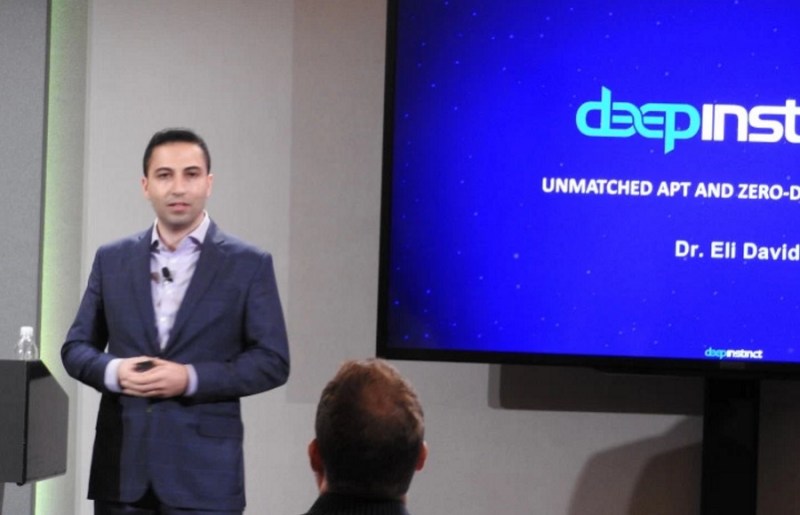
Above: Eli David, CTO of Deep Instinct.
Tel Aviv-based Deep Instinct is applying AI to the task of detecting malware. About 1 million new variants of malware are spread every day. Often, a new family of malware is only about 30 percent different from the code of something that came before. Many antivirus vendors focus on detecting known malware in a library, using reactive technology.
But Deep Instinct believes the better solution is deep learning, which can be used to detect unknown malware in real time. It doesn’t detect virus signatures, sandboxing of content, or heuristics. Instead, it only looks at the binary raw details of the file in question. And Deep Instinct doesn’t require frequent updates, said Eli David, chief technology officer at Deep Instinct. It trains the deep learning neural network on hundreds of millions of files. In short, it focuses on prevention, not reaction.
“We do not wait for the attack execution,” David said. “We protect against malware, anything from simple mutations up to nation-state attacks.”
The company built its own deep learning infrastructure from scratch, as it had to develop its own flavor of neural networks. The software runs efficiently on the combination of central processing units (CPUs) and graphics processing units (GPUs) and Nvidia’s CUDA software for running non-graphics software on graphics chips. The GPUs enable the company to do in a day what would take three months for a CPU.
Deep Instinct prunes 95 percent of the unnecessary processing threads so that it has a much smaller amount of data to analyze. The results are about 99 percent on detection rates, based on independent tests with its customers. By comparison, the competition gets about 80 percent detection.
Deep Instinct has a very low false-positive rate of about 0.1 percent, compared with 2 percent to 3 percent for a deep-learning rival, David said. And Deep Instinct only has to be updated every few months or so. The company started commercializing its software in 2016, and it expects to generate $10 million in revenue this year.
In 2018, it hopes to add a solution for traffic analysis, and it will expand to all other areas of cybersecurity over time. Rivals include companies like Cylance. Deep Instinct has 65 employes and has raised $50 million from Blumberg Capital, UST Global, CNTP, and Cerracap. The toughest problem is that people don’t understand what is in Deep Instinct’s “black box,” and they want to know how it works. But the company can easily demonstrate how it beats rivals at detecting the same problems, David said, and that usually convinces prospective customers.
3. Cape Analytics
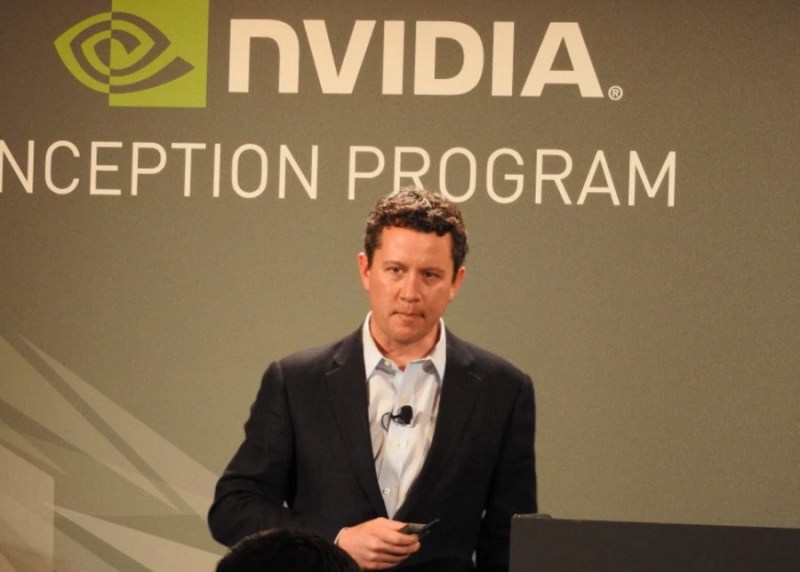
Above: Cape Analytics sales chief Busy Cummings
Home insurance companies have to collect data on more than 100 million homes in the U.S. That isn’t easy, and Cape Analytics is using geospatial imagery, computer vision, and machine learning to help.
Cape Analytics can collect aerial images that reveal a lot about a home, if they are properly analyzed, said Busy Cummings, vice president of sales. The initial focus is on the property insurance industry, but many others, from tax assessors to inspectors, also need a lot more data about homes.
Home owners are often unreliable sources of information about their own homes, partly because they many not know the answers and partly because they may understand how to game the system to get lower insurance rates, Cummings said. Public records are also a frequently used source of data, but they are often outdated. And using inspectors is costly and often time-consuming.
“The inspectors provide good information that affects valuation and pricing,” Cummings said. “But it’s a horrible experience because it arrives so late. [With this technology] we get the data in a timely way with the accuracy of inspection.”
Cape Analytics gets the aerial imagery from other sources, and it can show big changes, like a home being remodeled or damage from a big storm. It can also reveal risks, like lots of trees surrounding a home. Cape Analytics uses tens of thousands of GPUs to process the data in a fraction of the time it would otherwise take.
It can find out the shape and condition of a roof and what materials it’s made of. It can identify swimming pools, diving boards, pool enclosures, and other things. All of that data can be important. It shortens the application process and results in a faster insurance quote.
“We are building a living database of the 100 million homes in the U.S.,” Cummings said. “It improves the customer relationship with a shorter application process. It is better quality, faster, and less money. The insurance company can better understand the risk.”
Cummings showed an image of the 5.5 million homes in Florida, all computed in a matter of hours. Cape Analytics has more than 20 people and has raised $14 million from Data Collective, Formation 8, XL Innovate, Lux Capital, and Khosla Ventures.
4. Konux
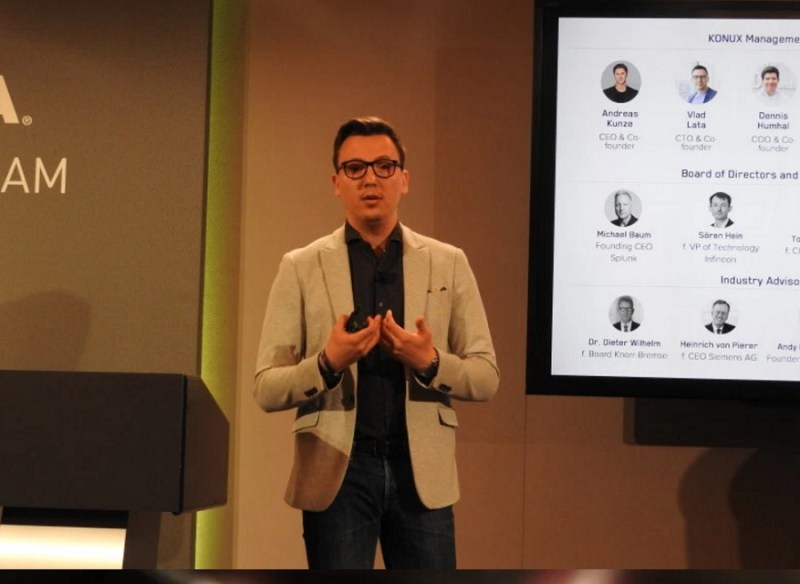
Above: Konux chief technology officer Vlad Lata.
By 2020, there will be about seven billion industrial assets hooked up to the Internet of Things, or everyday objects that are smart and connected. Konux wants to be the company that makes that happen for assets owned by railroad companies.
The Munich, Germany-based company is building the software systems needed to measure how the railroads are being used and to gain insights into that data, said Vlad Lata, chief technology officer at Konux.
The data on railways isn’t very reliable, so Konux makes a sensor that can be placed on the concrete labs that hold tracks in place. This can monitor the movement of tracks and the condition of switches. One of Konux’s customers is Deutsche Bahn, the German train company, which has more than 70,000 switches on its tracks throughout Europe.
Those switches require about five manual inspections a year, each requiring about three people for a minimum two-hour inspection. Deutsche Bahn spends hundreds of millions of dollars a year on switch maintenance. It’s a huge annual expense. And the labor cost across all rail companies around the world runs into the many billions of dollars.
Konux’s sensors gather information so the inspections aren’t needed as often. And as equipment fails, Konux gets alerts about the condition of the devices. Trains pass over the switches 20 times a day, which can cause deterioration in the switch. If a switch fails, it can result in a delays or even a train collision with catastrophic results.
“If you know how much usage a switch has had, you know when you should replace it,” Lata said. “The major rail companies want this product because it solves one of the big problems on their balance sheets.”
Each sale can be a big one, but the sales cycle is long.
Konux has more than 30 employees, and it has raised $18.5 million from NEA, Michael Baum, Andy Bechtolsheim, MIG Fonds, Torsten Kreindl, and Lothar Stein. Konux was founded in 2014.
5. Digital Genius
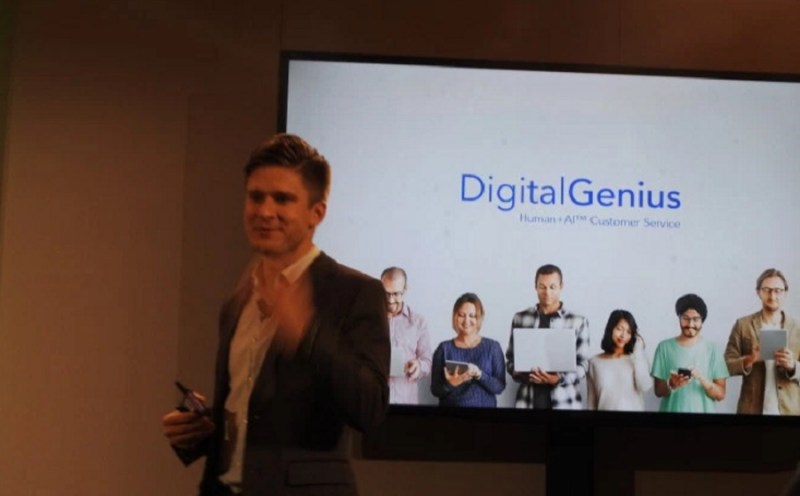
Above: Digital Genius cofounder Mikhail Naumov.
Digital Genius brings deep learning and AI to customer service operations. All of us spend about 43 days of our lives on the phone with customer service. It’s a $350 billion a year industry, and $300 billion of that cost lies in the salaries of people who are handling the calls.
Digital Genius started out by creating a chatbot that follows a rule-based system to help offload customer service. But the company found that chatbots have limited usefulness. Then Digital Genius shifted more of its focus to deep-learning algorithms.
“We built chatbots before they were cool, learned lessons of where they don’t work, and now we can solve problems much more quickly,” said Mikhail Naumov, cofounder of Digital Genius.
This solution can save a lot of money by reducing the workload for human operators. The handling time per query can be cut by 32 percent, the company says. KLM currently has 235 agents using Digital Genius’ service. Agents get about 100,000 messages a week, and Digital Genius analyzes the messages to see what types of issues they raise. The system then starts making suggestions for how to handle them. Agents can answer much faster, and they can offer feedback on the suggestions to make the results better over time.
San Francisco-based Digital Genius has 45 employees. It has raised $10 million from Lowercase Capital, Salesforce Ventures, RRE Ventures, LHV, Bloomberg Beta, Lumia Capital, Singularity Investments, Spider Capital, and Compound Ventures. Digital Genius was founded in 2014. The company is collaborating with Salesforce to show what is possible on top of the Salesforce platform for service.


